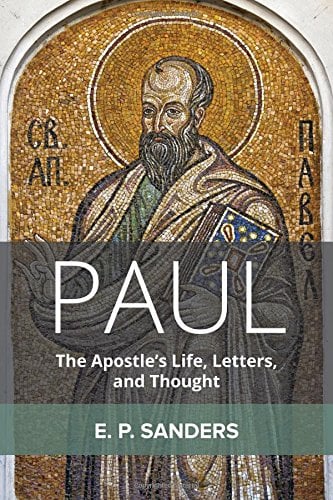In Rom. 12.1 Sanders takes logiken to mean spiritual— spiritual worship or service.
p. 691– Philo wrote (Spec. 1,277) “The symbolized meaning is just this and nothing else: that which is precious in the sight of God is not the number of [sacrificial] victims immolated but the true purity of a logiken [rational] spirit in him who makes the sacrifice.” The living sacrifice Paul expects has to do with their inner intention and commitment to be completely self-sacrificial in their service of God. They are not to be conformed to the world’s ways, but transformed in heart and mind.
p. 692— Rom. 12.14-21 seems to reflect some knowledge of Jesus’ teaching in the Sermon on the Mt. especially ‘bless those who persecute you’. Sanders thinks Paul doesn’t seem to know the command love your enemies, but rather derives the do not repay evil for evil from Prov. 20.22 cf. 1 Thess. 5.15, and from Prov. 25.21-22 on feeding enemies.
p. 694—What does Sanders make of Rom. 13.1ff. He says he’s glad that America followed the advice of John Locke about rebellion against tyranny rather than the advice of Paul. Sanders thinks Paul is being cautious as he approaches his trip to Rome because of the previous expulsion of Jews over Christ during the reign of Claudius which was recent in the past. So Paul wants calm and for Christians not to make waves at this point. He is not endorsing any and all bad behavior by rulers. Sanders thinks it less probable that Paul was concerned his letter might fall into the wrong hands. No, Paul was socially conservative taking a live and let live approach to things. Don’t make waves but live in peace with neighbors if at all possible. His own experience of incarceration and beatings surely meant he had no idealized notion that authorities always were ministers of proper justice. Sanders puts this social conservatism down to Paul’s belief that Christ would necessarily return soon. [No, his approach is drawing on Jesus’earthly teaching among other things, and again 1 Cor. 7 doesn’t say the time is short!]
pp. 696-97— Sanders says that when Paul reiterates some of the ten commandments it is always from the second table of the law, he never says that fulfilling the law involves worshipping Yahweh alone [which should have taught Sanders that there is a reason for this. Paul believes in the worship of Christ as part of the divine identity]. The fulfilling of the Law in Paul’s summaries has to do with how to treat other people— no murder etc.
Sanders suggests that the laws which made Jews a distinctive people (circumcision, Sabbath, kosher, purity) are in one category for Paul as works of the law, and other laws are still commandments of God. [Notice that both sets of commandments have to do with interpersonal behavior, which is to say with the second table of the commandments basically. So it is not a division between first table law not affirmed and second table law affirmed].
p. 699— Rm. 14-16 seems to reflect knowledge that Paul had received from the congregation in Rome. Sanders doubts that Paul knew precisely what was happening. He thinks if Paul had precise knowledge he might have been more specific [or he is cautiously generic even though he has precise knowledge, because he is not the founder of that church in Rome].
p. 701– It seems clear that the weak are those who keep Jewish food laws Lev. 11/Deut. 14 and the strong are those who eat meat forbidden in Jewish law. He compares Rom. 14.15 to 1 Cor. 8.8-13. In Romans the issue doesn’t seem to be eating or not eating idol meat, but rather the laws of kashrut which govern all meats not just idol meat. He concludes this is likely because Paul talks about days as well as foods going back and forth.
p. 702— were idolatry also an issue, Paul would likely have warned against it in Rom. 14. His concern is that the strong not damage the conscience of the weak. 14.4 makes clear that nothing is unclean itself, but it becomes unclean for those who think so. See 14.13,15,20,21 and 15.1.
p. 703— the observance of the Day here must refer to the Sabbath because it is intertwined with the discussion about clean food. We should not be surprised that food and days are in dispute since the congregation in Rome like in Antioch involves both Jews and Gentile.
p. 704— circumcision, food laws, Sabbath are matters of indifference for Paul. What matters is faith in Christ and the love commandment. This view could certainly lead to a break with Judaism, though Paul never entirely broke away from the Law.
p. 705— “Throughout Romans 14 and the first verses of Romans 15 Paul is trying to foster tolerance, harmony, and good will. His arguments are these: 1) everyone has a conscience and all should follow their conscience, which is to be judged only by God; 2) live by faith; 3) love your neighbor. Christians shouldn’t judge one another. The strong should put up with the failings of the weak. The only thing that really matters is belong to the Lord (14.8). Paul also affirms here the earth is the Lord’s and it’s all good, all food etc. is good.












